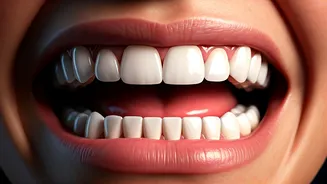Anaemia: Pale Gums
Anaemia, often characterized by low haemoglobin and iron deficiency, manifests in noticeable oral symptoms. Pale gums are a significant indicator, reflecting
a reduced red blood cell count. Beyond the gums, the tongue can also show signs of the condition, becoming sore, or exhibiting a burning sensation. These oral changes aren't just cosmetic; they signal a deeper issue impacting the body's ability to carry oxygen. Addressing these oral symptoms often involves identifying and treating the underlying cause of the anaemia, which might include dietary adjustments or medical interventions depending on severity and origin.
Heart Disease: Gum Issues
The link between oral hygiene and heart health is surprisingly strong. Poor oral hygiene and the resulting gum inflammation can be indicators of potential cardiovascular issues. Research suggests a pathway where bacteria from the mouth enter the bloodstream, potentially contributing to the blockage of arteries. This connection underscores the importance of maintaining excellent oral hygiene practices. Regular brushing, flossing, and dental check-ups become crucial, as these can minimize the presence of harmful bacteria and, in turn, lower the risk of heart-related complications. It is an important and very sensitive aspect.
Vitamin Deficiencies: Bleeding
The mouth can serve as a canary in the coal mine when it comes to vitamin deficiencies. Bleeding gums, a common symptom, often point to inadequate levels of essential vitamins, like C and B12. Mouth ulcers, those annoying and painful sores, can also signal these deficiencies, which can cause cracking at the corners of the mouth. Recognizing these oral manifestations is the first step towards rectifying the nutritional imbalance. Supplementation, dietary changes, and medical advice are common steps to get your body back in proper shape. Consult a doctor to determine the exact nature of the deficiency.
Gastroesophageal Reflux: Acid
Acid reflux, a condition where stomach acid flows back into the esophagus, can significantly impact oral health. The acid can erode tooth enamel, especially on the backside of the teeth. This erosion weakens the teeth, increasing the likelihood of cavities and other dental problems. Recognizing these early signs and managing acid reflux are critical. Lifestyle modifications, such as avoiding trigger foods, or medical interventions, may be necessary to alleviate symptoms. Treating the root cause is crucial to preserve the health of the teeth and avoid further digestive issues.
Osteoporosis: Weak Teeth
Oral health can reflect bone density, making it a potential indicator of osteoporosis. Weak or loose teeth, along with receding gums, may suggest reduced bone density, which is a key characteristic of osteoporosis. As bone density decreases, the jawbone can weaken, compromising the support structure for teeth. Addressing this through early diagnosis and treatment of osteoporosis is crucial not just for bone health but for maintaining dental health. Calcium and vitamin D supplementation, alongside lifestyle modifications, often form part of a comprehensive strategy.
Diabetes: Gum Infections
Diabetes often presents with several oral warning signs. Frequent gum infections, dry mouth, and slower healing after dental procedures can all be indicators of high blood sugar levels. Elevated glucose levels in the saliva create an environment that promotes bacterial growth, increasing the risk of gum disease and infections. The dry mouth makes it more likely for the person to have this kind of problem. Therefore, consistent dental care is essential for people with diabetes to manage oral health complications. Regular check-ups and good oral hygiene practices become even more critical in preventing and treating these signs.












